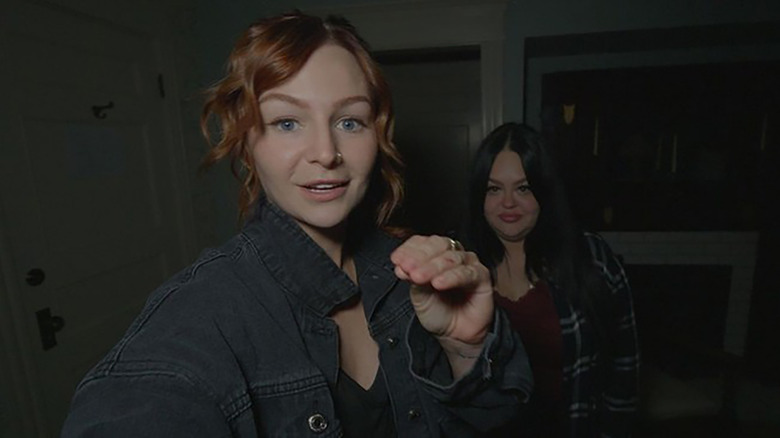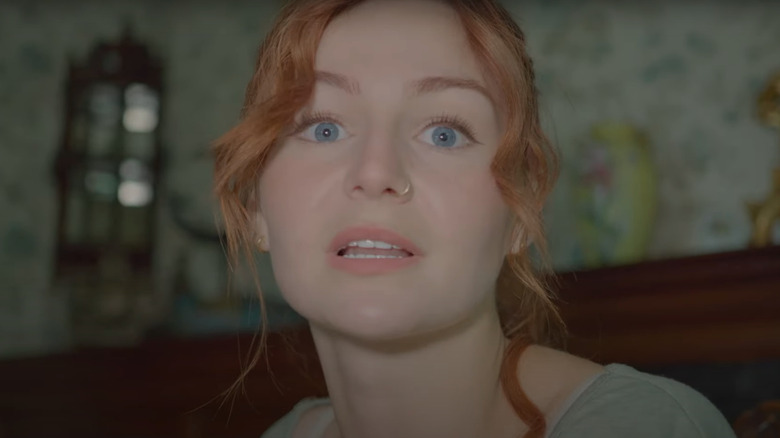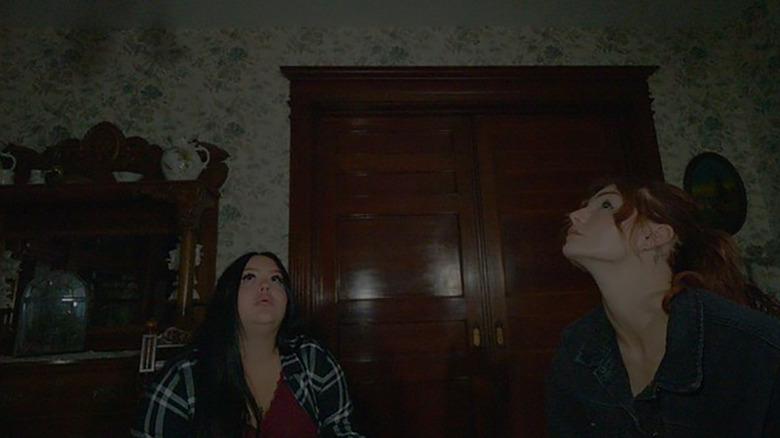This Is The Scariest Horror Movie Of 2025, But Not For The Reasons You'd Think
Hollywood is desperately trying to woo Gen Z into theaters, aware that this scrolling-obsessed demographic has massive untapped buying power (see "Five Nights at Freddy's" for the proof) but a deep preference for phones over film projectors. Studios continue to blame the increased popularity of streaming for the decline in younger audiences showing up to the megaplex, but newer research shows Gen Z and Gen Alpha aren't just skipping theaters, but they're also skipping movies altogether in favor of bite-sized content on social media. A TikTok-shaped tectonic shift has shaken the industry, affecting everything from influencer-dominated press junkets to relaxed phone-use rules during screenings.
The idea that influencers can bring in audiences isn't new. In 2014, YouTuber Shane Dawson won the filmmaking competition show "The Chair" by fan vote thanks to his 10 million-strong following, leaving the unquestionably better filmmaker, relative unknown A.M. Lukas, in the dust. Still, the internet has also launched some of today's most exciting creatives: Quinta Brunson (the creator and star of "Abbott Elementary") got her start at Buzzfeed, the Philippou brothers (YouTube's RackaRacka) now create festival hits like "Talk to Me" and "Bring Her Back," and YouTuber Chris Stuckmann's debut feature "Shelby Oaks" is coming soon from NEON. Even Bo Burnham parlayed early YouTube fame into being halfway to an EGOT.
The latest internet personality-to-film crossover is "House on Eden," a found footage horror flick from Shudder and RLJE Films starring writer/director Kris Collins (@KallMeKris), Celina Myers (@CelinaSpookyBoo), and editor Jason-Christopher Mayer — all of whom boast a combined TikTok audience of over 75 million. Using an "outlined improvisation" style à la "The Blair Witch Project," the trio investigates a haunted house while filming their every scream and shaky-cam reaction.
And while the film didn't work for me at all, I still left the theater rattled — not by ghosts, but by the sheer dread of watching a movie created by people, who've spent the past five years packaging every fleeting thought and emotion for public consumption, trying to act "normal." It's a new kind of uncanny horror, one where the truly terrifying thing is realizing the line between performance and authenticity has all but disappeared.
The plague of being constantly perceived ruins House on Eden
I was already familiar with Kris Collins and Celina Myers; they're both talented, wildly popular TikTok creators whose content the For You Page correctly flagged as my kind of way to waste time on my phone. I'm not parasocially attached to them the way their core fandom is (just take a look at the comment sections of their videos and you'll get what I mean), but I genuinely hoped their feature-length collaboration would prevail. Social media stars face an unfair stigma; there's this idea that if your fame wasn't earned through "traditional" channels, your talent is somehow suspect. But Collins and Myers have long proved their comedic and creative chops in short-form content, and I was rooting for their debut feature to succeed.
The trio plays versions of themselves in the film, sticking to the personas that made them famous. It's a clever meta move in theory — staying authentic, giving fans what they love — but it ultimately derails the film. Like every haunted house story, much of the early runtime is spent on character-building: the group joking around, bickering, and bonding. But unless you already have an established "relationship" with these creators, the film's attempt to humanize them falls flat because nothing feels real, even in the "natural" moments.
Every line and every interaction has the preternatural glaze of content scripting — not screenwriting, but comment-section-driven calibration. Years of fan replies and algorithmic survival have taught these performers how to sound relatable and how to phrase things for maximum engagement without stoking the ire that leads to becoming the internet's "main character" of the day. They've even perfected how to manipulate their faces into a reaction worthy of a thumbnail. The way they communicate, even during the "raw" moments, doesn't resemble instinctual behavior, but performance optimized for virality. Watching it play out in long-form, without the quick, forgiving scroll of TikTok, is strangely unsettling and philosophically harrowing.
You can almost see the internal calculation happening: "How do I phrase this in the most broadly palatable, least alienating, favorable way possible?" Even offhand comments sound massaged, preemptively softened, and tailored for wide appeal. It creates a bizarre dissonance: performers trying to seem real, yet clearly operating in a space where realness has been sanded down by years of endless feedback loops. The result isn't just a lack of authenticity — it's an overproduced version of verisimilitude that's been beta-tested into oblivion.
And the most perilous thing is that it seems so second-nature at this point that I don't know if they're even aware that they're doing it.
The industry still has no idea what to do with social media stars
We're living in an era of constant surveillance, either by the tech lords who have infiltrated every aspect of human life or the risk of ending up as the bystander of someone else's TikTok and inspiring days of discourse based on a 10-second clip. The cognition of this Orwellian hypervisibility has transformed the way people exist and interact with others — online and off — but "House on Eden" is the first time we're seeing it bleed into a feature film without it being central to the film's ethos like the successful Shudder releases "Deadstream" and "Sissy."
The industry has always been where art and commerce collide, but lately, commerce has all but steamrolled the art. "Creative" decisions now amount to whatever trend-chasing data points will appease the algorithm and keep investors sedated. Studios are obsessed with social reach, as if slapping a multi-million-follower badge on your cast list is some kind of magical cheat code for box office success. But the numbers don't lie: massive followings have yet to correlate to ticket sales. If they did, Eli Roth's "Thanksgiving" would've dominated 2023's box office thanks to Addison Rae's casting, and "The D'Amelio Show" wouldn't have flatlined after 28 episodes. The unfortunate truth is that most content creators wouldn't be nearly as popular if fans had to pay to watch them.
Meanwhile, suits are still drooling over the fantasy that influencers are Hollywood's secret weapon, so much so that established talents like Elle Fanning are losing roles for the crime of not having enough Instagram followers. That's why something like "House on Eden" feels so existentially bleak, because it's the exact kind of half-baked golden goose that clueless executives dream about. It's a film shaped by people who spend every waking hour tailoring content to please their audiences in real time, shaped by the manipulative sciences that have taught them how to imitate familiarity. This is a script not birthed by storytellers, but by serotonin farmers. Its stars aren't viewed as actors but "besties" from your phone, propped up as relatable idols rather than artists.
And yet, audiences will forgive the recycled horror tropes, derivative plots, and eye-roll-inducing exposition drops on display because they're "just so happy for them for making a movie!" This isn't a bold new era of filmmaking — it's foreshadowing the endgame for executives who got into the business not to make films, but to mine engagement. The result is a preordained triumph of mediocrity, clapped along by fans who mistake being able to recognize a reference for quality.


